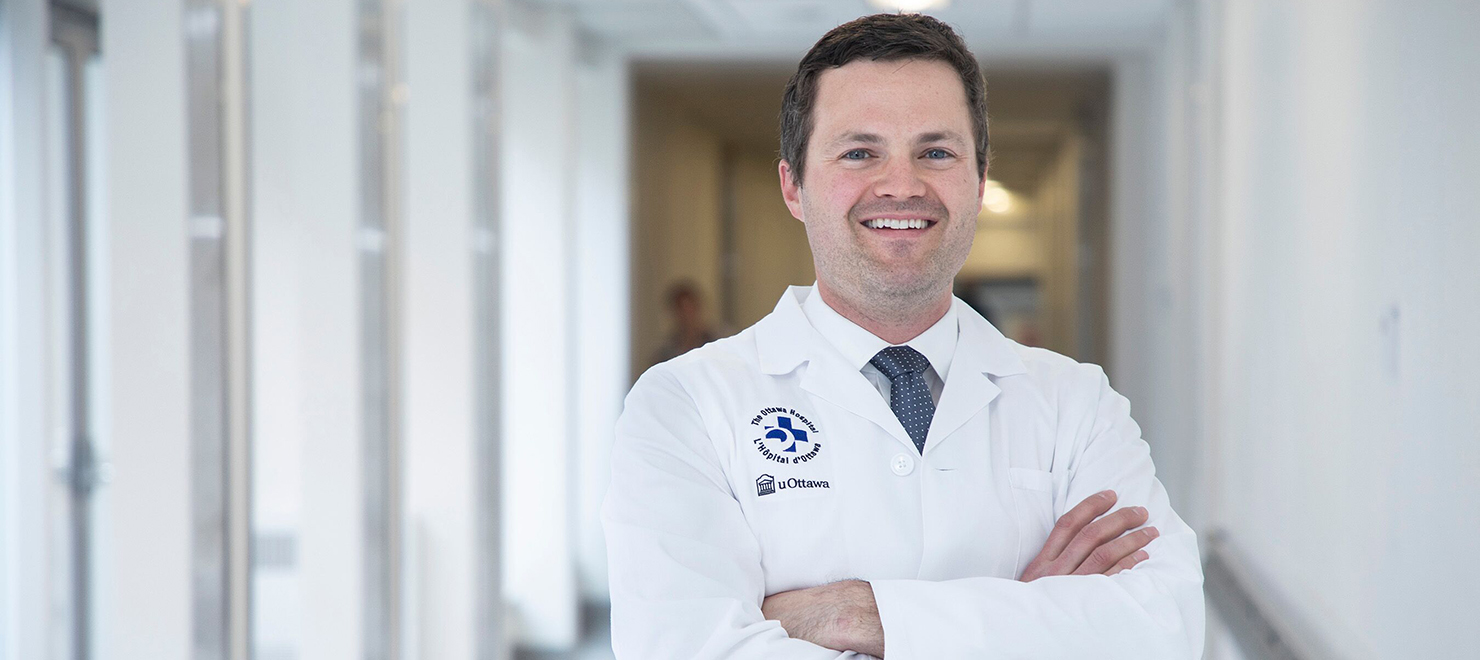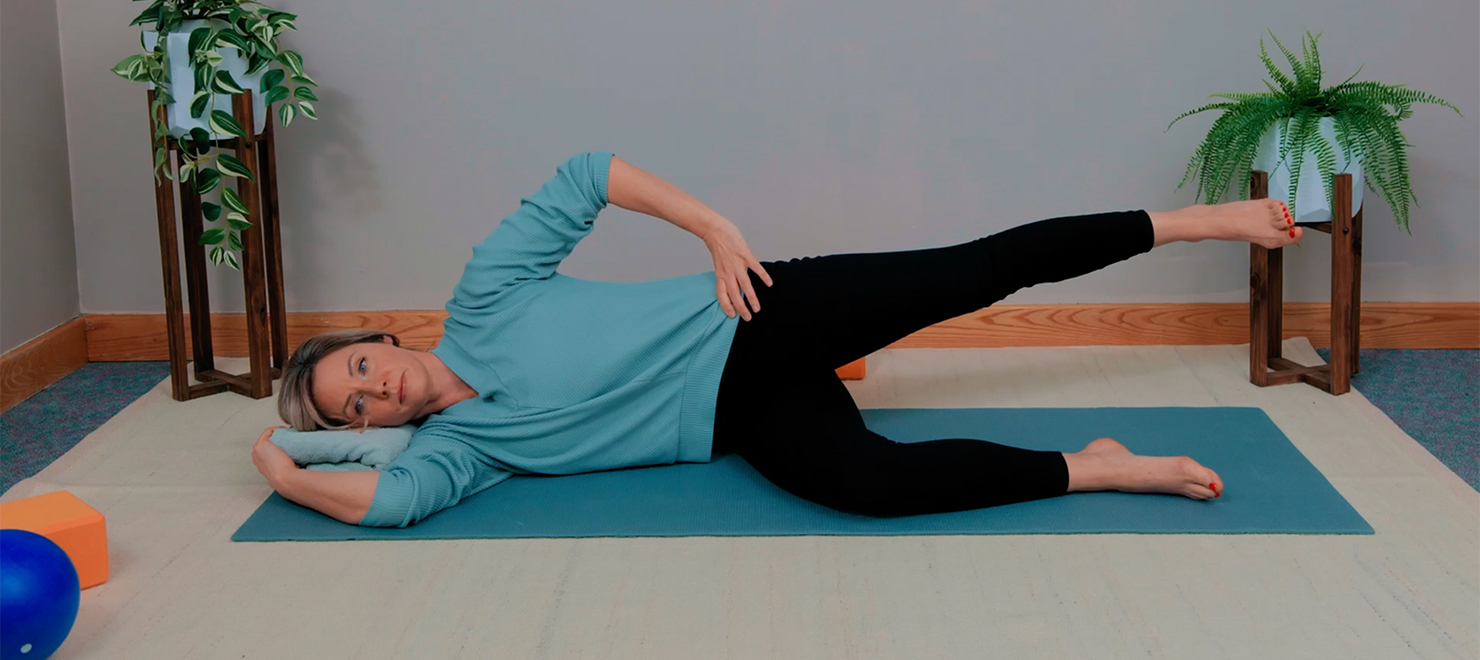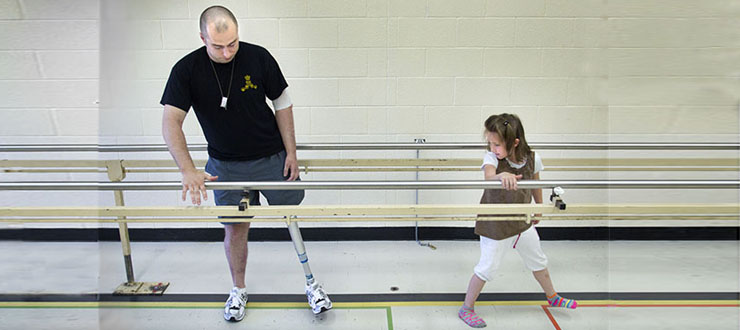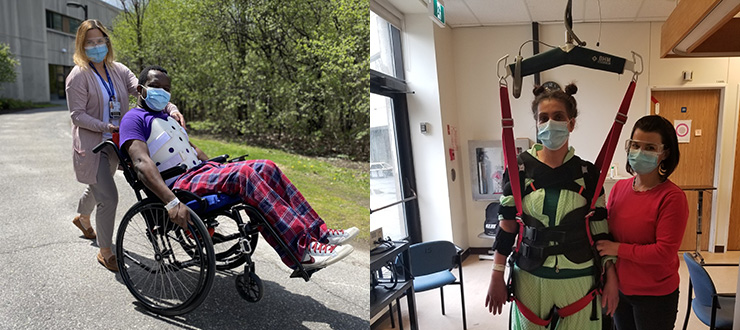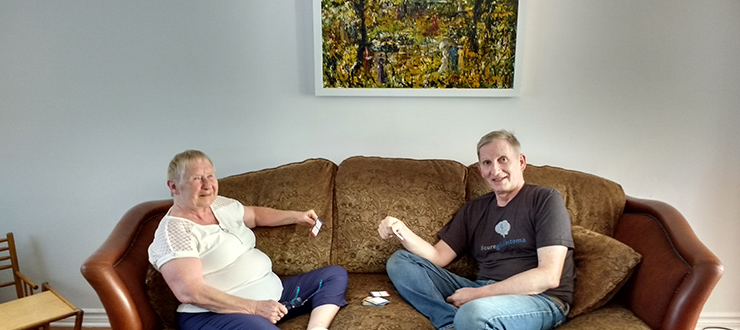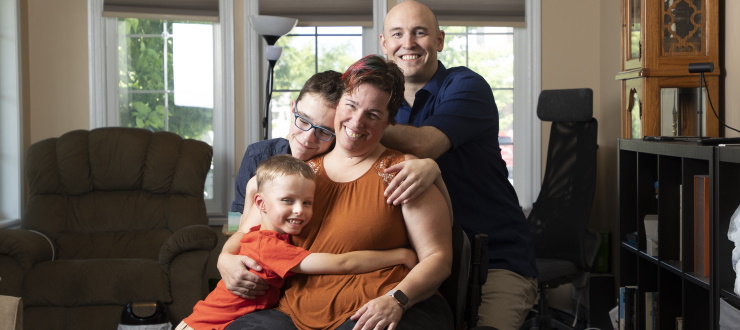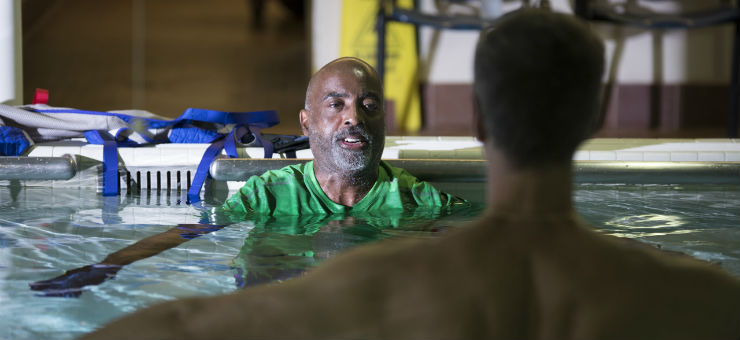
Fran Cosper had three physiotherapy sessions a week in The Ottawa Hospital Rehabilitation Centre pool. “There’s something about visually seeing yourself walk and move in a weightless environment – it’s a mind-body connection,” said Cosper, who walked out of the centre in October. “That’s when the mind realizes ‘it’s possible.’ If you can visualize it, think it, speak it, it’ll happen.”
Long-distance cyclist Fran Cosper and his friends often biked 120 kms on a Saturday. But that changed a year ago when he woke in the night and couldn’t feel his legs.
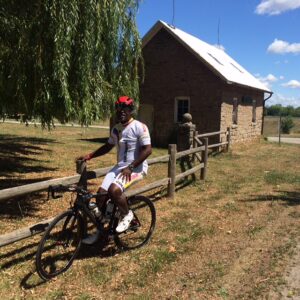
Fran Cosper took a break in Niagara-on-the-Lake, Ontario, during the 125-km benefit ride for Toronto’s SickKids Hospital in 2016.
Cosper struggled out of bed the next morning and tried to do stretching exercises.
“I thought I had a pinched nerve,” he said. “I went to get on my hands and knees, and fell face first on the carpet. I thought, ‘Well, I can’t move. This is much more serious.’ My wife, Elise, came down and saw I had facial paralysis, and thought I’d had a stroke.”
Cosper knew it wasn’t a stroke because both sides of his body were paralyzed. (Stroke affects only one side.) Doctors at The Ottawa Hospital diagnosed him with Guillain Barré Syndrome (GBS) in February 2017. This rare autoimmune disorder causes the immune system to attack the nerves, damaging the myelin sheath, which is the nerves’ protective covering. As a result, the brain can’t transmit signals to the nerves in the muscles, causing weakness, numbness or, as in Cosper’s case, paralysis.
About one in 100,000 Canadians contracts GBS every year. Patients do recover but it can take more than a year because the nerves re-grow slowly, one millimetre per month.
GBS can be brought on by an infection or virus. The 56-year-old Cosper had had two colds back-to-back, including a high fever, which may have thrown his immune system into overdrive. Within days, his balance was off and he had difficulty lifting pots to cook dinner. Hours later, the disease was full blown, attacking his nervous system. Within 24 hours, Cosper couldn’t move.
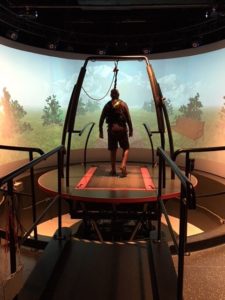
Fran Cosper used the Virtual Reality Lab, which is one of only two in Canada, during his rehab. The lab was purchased thanks to the support of the community and the Canadian Forces Health Services Group. Canadian Forces soldiers, and patients like Cosper, use it extensively to help them regain their balance and learn to walk again.
“We see patients with Guillain Barré Syndrome at The Ottawa Hospital Rehabilitation Centre probably five or six times a year,” said Dr. Vidya Sreenivasan, doctor of physical medicine and rehabilitation. Some have mild cases, but others, like Cosper, are more serious.
For Cosper, the disease continued its nerve damage following his admission to the hospital. After two weeks, he was transferred to the Rehab Centre, where his care team included doctors, psychologists, social workers, recreation therapists, physiotherapists, respirologists, occupational therapists and nurses.
“He arrived for physiotherapy in an electric wheelchair that he controlled by moving his head, because motor skills in his arms and fingers were completely absent,” said assistant physiotherapist Andrew Atkinson. “There was a shorter list of the things he could move. From a chair position, he could extend his left leg and hold it against gravity. His right leg he could kick, but could not hold it. He basically presented like a quadriplegic.”
Cosper was completely dependent for care. He needed to be washed, dressed, and turned in bed. He couldn’t even close his eyes. The nurses had to tape his eyelids shut so he could sleep.
“It must be like being buried alive,” said Atkinson.
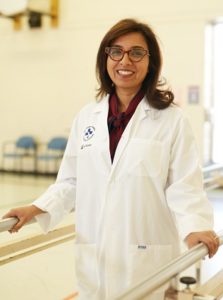
Both Dr. Sreenivasan (above) and Atkinson (below) agree that Cosper’s excellent fitness level, as well as his determination and positive attitude, helped accelerate his recovery.
The worst part, Cosper explained, was the excruciating pain in every part of his body.
“Fran is still in a lot of severe pain because his nerves have been damaged,” said Dr. Sreenivasan. “He suffers a neuropathic pain that can feel anywhere from numb, burning, electric shock, or deep toothache. Pain management was very important.”
Cosper had physiotherapy five hours a day, including three times a week in the Rehab Centre Pool. Within two months, he could stand and take steps with help. He learned to walk again: at first with a harness, then using the parallel bars. His arms were slower to recover and the fine motor skills in his fingers will take longer. Cosper plays jazz on the saxophone, so is motivated to get his fingers working again.
“It’s not a foregone conclusion that I’ll ever play again,” Cosper said. “That’s the reality. But you have to have those moments of darkness. Embrace them and move on – that’s what you gotta do.”
Cosper’s positive attitude was infectious.
“What stood out about him was that he would encourage other patients as well,” said Dr. Sreenivasan. “Everybody has dark days. They wake up and think ‘I can’t do it. I just can’t see the light at the end of the tunnel.’ Fran was able to provide that light at the end of the tunnel and help others, which is pretty extraordinary considering what he was going through himself.”
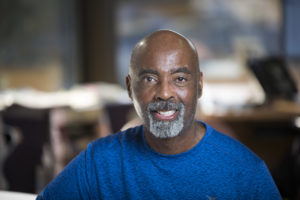
Fran Cosper expects it will take him a year to fully recover from Guillain Barré Syndrome.
The nurses helped Cosper with day-to-day care, teaching him how to wash and dress himself and be independent again.
“I can honestly say that the kindness and level of care I’ve got really humbled me. The nurses and staff have just been marvelous,” said Cosper. “I’ve basically been swiped off the planet for a year. But the only negative thing about being in the hospital is the disease itself.”
Cosper was discharged and went home just before Thanksgiving. He walked out of the Rehab Centre using a walker. When he returned in early November for a follow-up physiotherapy appointment, he walked in unaided. Cosper is confident that he’ll be back on his bike in the spring.
The Ottawa Hospital uses donations(opens in a new tab) to invest in equipment at the Rehabilitation Centre that will help people like Fran Cosper.

Support patient care and research at
The Ottawa Hospital
You might also like…
Do you have a surgery coming up? Here are five “prehab” tips to help you recover faster
You’ve probably heard about rehabilitation, but what about “prehabilitation”? Prehab is all about getting your body and mind in top shape before surgery so you can enjoy a smoother, quicker recovery. Discover five essential prehab strategies from researcher Dr. Daniel McIsaac.
A guide to mindful movement for pain management
Are you seeking relief from pain, discomfort or stress? In these four videos, Physiotherapist Cristin Kargus guides you through gentle, mindful movements to help you reconnect with your body.
Pushing limits: Canadian soldier leads incredible life before and after IED blast
When an IED in Afghanistan caused significant injuries to Sgt. Bjarne Nielsen’s body, his recovery journey led him to specialized rehabilitation at The Ottawa Hospital.
Sex education and wheelies: Spinal cord injury patients receive more equitable access to care during rehabilitation
What people with spinal cord injuries (SCIs) learn about sex, wheelchair skills and more isn’t the same everywhere. A new program at The Ottawa Hospital Rehabilitation Centre is taking on sex education and other key topics to help make sure SCI patients get the information they want and need.
Stroke, brain tumour, awake brain surgery: nothing stops Ron Wulf
A quiet night in for linguist Ron Wulf was the beginning of a long health journey that included a stroke, a brain tumour and awake brain surgery. He credits the staff at The Ottawa Hospital and his love for language for helping him recover and is sharing his experience with the medical community.
Compassionate care awaited the Westboro bus crash patients
Marcie Stevens was one of 13 severely-injured patients rushed to The Ottawa Hospital Trauma Centre on Jan. 11, 2019. As her recovery continues, she’s grateful for the exceptional care she has received.


 To reset, hold the Ctrl key, then press 0.
To reset, hold the Ctrl key, then press 0.
